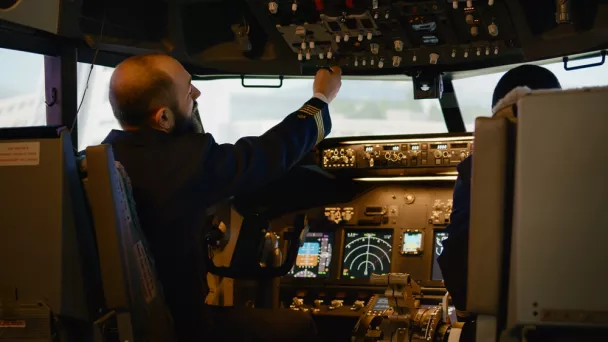
News
Medical expertise in the service of aviation safety
on 2024/10/10
Aviation medicine is often ignored by the general public, yet it is a crucial pillar in ensuring flight safety. Dr Olof Åhréus has devoted his career to this speciality. At Capio Flygmedicin Lund, a Ramsay Santé subsidiary specialising in this field, he has combined his skills as a pilot and doctor to ensure the health of aviation professionals.

Medical expertise in the service of aviation safety
A medical speciality serving flight safety
Dr Olof Åhréus, a former airline pilot and doctor specialising in internal medicine and cardiology, found his calling in aviation medicine. "It seemed like the perfect fusion of my two passions," he says. After working as a company doctor for Scandinavian Airlines and in a hospital, he found his niche at Capio Flygmedicin Lund, a clinic specialising in aviation medicine.
Aviation medicine is governed by strict standards defined by the European Aviation Safety Agency (EASA). Each member country applies these regulations via its own national authorities.
Dr Åhréus explains: "Every year, pilots, flight crews and air traffic controllers have to undergo rigorous medical examinations to assess their state of health. This includes an assessment of their physical condition, with a full examination, as well as their mental health.
If the pilot meets the required health criteria, he or she will be issued with a medical certificate valid for a specified period. "This rigorous process is essential to ensure that all aviation professionals are in the best possible health to carry out their work," adds Dr Åhréus.
A typical day in the life of an aviation doctor
The daily routine of an aviation doctor is punctuated by hour-long consultations that include a series of standardised tests to assess the patient's state of health. "When complex medical problems arise, we work with other specialists to provide comprehensive care," explains Dr Åhréus.
The challenges don't stop at the physical assessment. For example, a pilot suffering from depression may be referred to a psychiatrist for a more in-depth assessment. "Detecting psychological problems is particularly tricky because pilots may hide their difficulties for fear of losing their licence. It is crucial for us to remain vigilant and perceptive in order to detect any behavioural anomalies," he explains.
A career dedicated to supporting pilots
Dr Åhréus' experience as a pilot gives him a unique perspective on the physical and psychological demands placed on pilots. "This dual skill set, combining medical expertise with knowledge of the realities of the cockpit, is essential for accurately assessing the health of pilots," he says. This approach is particularly useful when it comes to allaying pilots' anxieties during medical check-ups.
"Pilots are often more relaxed when they know that I'm a former colleague. It makes communication easier, especially when health issues need to be addressed. My role is to support them and work with the relevant authorities to preserve their careers whenever possible," explains Dr Åhréus, recalling with emotion the memory of a 55-year-old Swedish air traffic controller who was confronted with a cardiac arrhythmia detected after an episode of tachycardia.
Working in Copenhagen, she was subject to strict requirements imposed by the Danish authorities. Despite effective treatment and a precise diagnosis, the authorities required a physical performance test, imposing fitness criteria comparable to those of a 25-year-old. Thanks to her determination and the support of Dr Åhréus, she passed the test with a performance equivalent to that of a young adult, which enabled her to save her career. "It was one of the most moving moments of my career," he recalls.
A profession with a future
Aviation medicine is an essential speciality that contributes to the safety of millions of passengers worldwide. As the demand for flights continues to grow, the importance of this specialisation will only increase, offering numerous opportunities for young doctors interested in this field. "The demand for qualified professionals in this sector will continue to grow," concludes Dr Åhréus.
